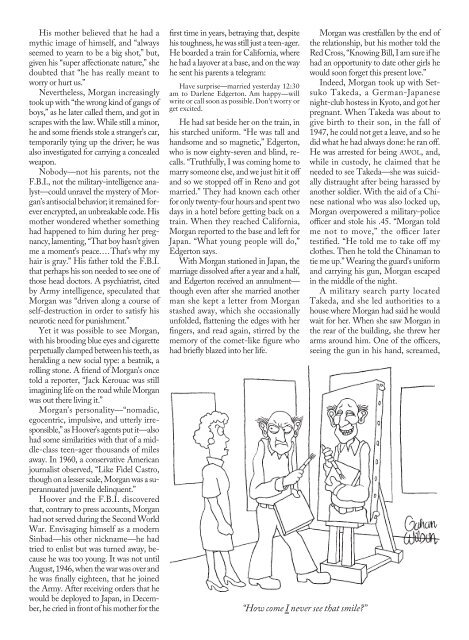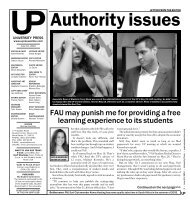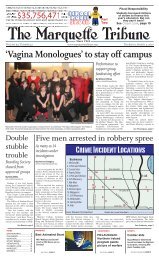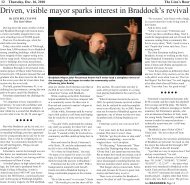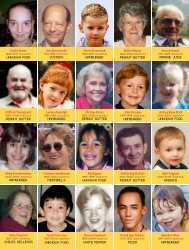THE YANKEE COMANDANTE
THE YANKEE COMANDANTE
THE YANKEE COMANDANTE
Create successful ePaper yourself
Turn your PDF publications into a flip-book with our unique Google optimized e-Paper software.
His mother believed that he had a<br />
mythic image of himself, and “always<br />
seemed to yearn to be a big shot,” but,<br />
given his “super affectionate nature,” she<br />
doubted that “he has really meant to<br />
worry or hurt us.”<br />
Nevertheless, Morgan increasingly<br />
took up with “the wrong kind of gangs of<br />
boys,” as he later called them, and got in<br />
scrapes with the law. While still a minor,<br />
he and some friends stole a stranger’s car,<br />
temporarily tying up the driver; he was<br />
also investigated for carrying a concealed<br />
weapon.<br />
Nobody—not his parents, not the<br />
F.B.I., not the military-intelligence analyst—could<br />
unravel the mystery of Morgan’s<br />
antisocial behavior; it remained forever<br />
encrypted, an unbreakable code. His<br />
mother wondered whether something<br />
had happened to him during her pregnancy,<br />
lamenting, “That boy hasn’t given<br />
me a moment’s peace....That’s why my<br />
hair is gray.” His father told the F.B.I.<br />
that perhaps his son needed to see one of<br />
those head doctors. A psychiatrist, cited<br />
by Army intelligence, speculated that<br />
Morgan was “driven along a course of<br />
self-destruction in order to satisfy his<br />
neurotic need for punishment.”<br />
Yet it was possible to see Morgan,<br />
with his brooding blue eyes and cigarette<br />
perpetually clamped between his teeth, as<br />
heralding a new social type: a beatnik, a<br />
rolling stone. A friend of Morgan’s once<br />
told a reporter, “Jack Kerouac was still<br />
imagining life on the road while Morgan<br />
was out there living it.”<br />
Morgan’s personality—“nomadic,<br />
egocentric, impulsive, and utterly irresponsible,”<br />
as Hoover’s agents put it—also<br />
had some similarities with that of a middle-class<br />
teen-ager thousands of miles<br />
away. In 1960, a conservative American<br />
journalist observed, “Like Fidel Castro,<br />
though on a lesser scale, Morgan was a superannuated<br />
juvenile delinquent.”<br />
Hoover and the F.B.I. discovered<br />
that, contrary to press accounts, Morgan<br />
had not served during the Second World<br />
War. Envisaging himself as a modern<br />
Sinbad—his other nickname—he had<br />
tried to enlist but was turned away, because<br />
he was too young. It was not until<br />
August, 1946, when the war was over and<br />
he was finally eighteen, that he joined<br />
the Army. After receiving orders that he<br />
would be deployed to Japan, in December,<br />
he cried in front of his mother for the<br />
first time in years, betraying that, despite<br />
his toughness, he was still just a teen-ager.<br />
He boarded a train for California, where<br />
he had a layover at a base, and on the way<br />
he sent his parents a telegram:<br />
Have surprise—married yesterday 12:30<br />
am to Darlene Edgerton. Am happy—will<br />
write or call soon as possible. Don’t worry or<br />
get excited.<br />
He had sat beside her on the train, in<br />
his starched uniform. “He was tall and<br />
handsome and so magnetic,” Edgerton,<br />
who is now eighty-seven and blind, recalls.<br />
“Truthfully, I was coming home to<br />
marry someone else, and we just hit it off<br />
and so we stopped off in Reno and got<br />
married.” They had known each other<br />
for only twenty-four hours and spent two<br />
days in a hotel before getting back on a<br />
train. When they reached California,<br />
Morgan reported to the base and left for<br />
Japan. “What young people will do,”<br />
Edgerton says.<br />
With Morgan stationed in Japan, the<br />
marriage dissolved after a year and a half,<br />
and Edgerton received an annulment—<br />
though even after she married another<br />
man she kept a letter from Morgan<br />
stashed away, which she occasionally<br />
unfolded, flattening the edges with her<br />
fingers, and read again, stirred by the<br />
memory of the comet-like figure who<br />
had briefly blazed into her life.<br />
“How come I never see that smile?”<br />
Morgan was crestfallen by the end of<br />
the relationship, but his mother told the<br />
Red Cross, “Knowing Bill, I am sure if he<br />
had an opportunity to date other girls he<br />
would soon forget this present love.”<br />
Indeed, Morgan took up with Setsuko<br />
Takeda, a German-Japanese<br />
night-club hostess in Kyoto, and got her<br />
pregnant. When Takeda was about to<br />
give birth to their son, in the fall of<br />
1947, he could not get a leave, and so he<br />
did what he had always done: he ran off.<br />
He was arrested for being AWOL, and,<br />
while in custody, he claimed that he<br />
needed to see Takeda—she was suicidally<br />
distraught after being harassed by<br />
another soldier. With the aid of a Chinese<br />
national who was also locked up,<br />
Morgan overpowered a military-police<br />
officer and stole his .45. “Morgan told<br />
me not to move,” the officer later<br />
testified. “He told me to take off my<br />
clothes. Then he told the Chinaman to<br />
tie me up.” Wearing the guard’s uniform<br />
and carrying his gun, Morgan escaped<br />
in the middle of the night.<br />
A military search party located<br />
Takeda, and she led authorities to a<br />
house where Morgan had said he would<br />
wait for her. When she saw Morgan in<br />
the rear of the building, she threw her<br />
arms around him. One of the officers,<br />
seeing the gun in his hand, screamed,


